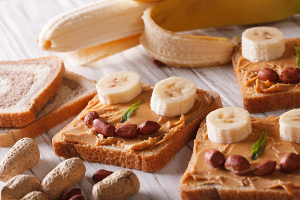
Early Peanut Introduction – Why and how?
By: Dr. Emily Barrios
The case for starting common allergens early
As recently as the early 2000s, it was recommended to wait until after your baby’s first birthday to introduce peanuts with the belief that early avoidance would prevent the development of allergy. We now know that the opposite is true! In 2015, a large randomized controlled study called the LEAP trial showed that early introduction of peanuts at age 4-6 months to babies with high risk of developing a peanut allergy (babies with severe eczema and/or known egg allergy) led to an ~80% reduction in peanut allergy.
There is also emerging evidence that early introduction of the other most common allergens (especially egg) may reduce development of food allergy.
How to start
Once your baby is tolerating a few solid foods like fruits, vegetables and/or cereals, they are ready to add peanut and other allergens! This can be as early 4-6 months old in most babies.
Peanut butter can be a sticky choking hazard, so there a few options to make a developmentally-appropriate peanut snack for your baby (recipes here)
– peanut puffs – can be softened with a few teaspoons of water or milk
– smooth peanut butter thinned with water or milk or mixed into a fruit or vegetable puree
– peanut powder (such as PB2) mixed into a puree or cereal
Plan to introduce a new allergen early in the day when you can observe your child for at least 2 hours after eating. Start by giving your baby a small taste of the food. Observe for 5-10 minutes–if no reaction, give a full serving ( ~2 grams of peanut protein). Once you’ve introduced peanut into the diet, give it daily for a few days in a row, then plan to keep it in the rotation of foods (shoot for at least once per week!) You can follow this plan with eggs, tree nuts, and other common allergens as well.
Talk to your doctor if your baby has severe eczema or a known egg allergy. A skin prick allergy test may be recommended prior to peanut introduction.
Signs of allergic reaction
Mild symptoms include a rash or a few hives around the mouth or on the face. Rare but severe symptoms including swelling of lips, coughing/wheezing/difficulty breathing, recurrent vomiting and/or diarrhea, change in skin color (blue or pale), full body hives, or lethargy.
If you think your child is having a severe allergic reaction, call 911 or take them to the emergency department.
Questions?
We know that introducing solid foods and allergens to your baby can be both exciting and stressful, and we are always here to help! Ask about introducing allergens at your child’s 4 month well child exam, and feel free to reach out to us with questions or concerns! If you are feeling anxious about peanut introduction and would like to join us in the office for your baby’s first peanuts, check our schedule for upcoming Peanut Butter Parties!











Most Commented